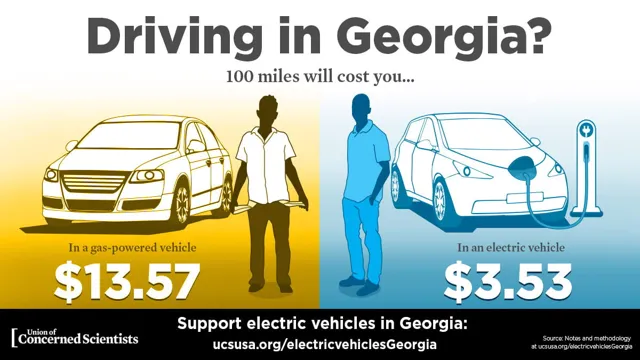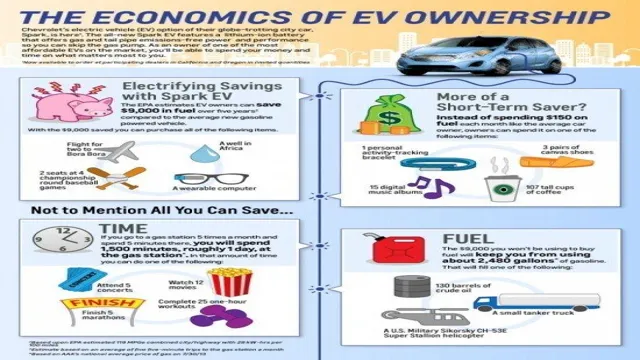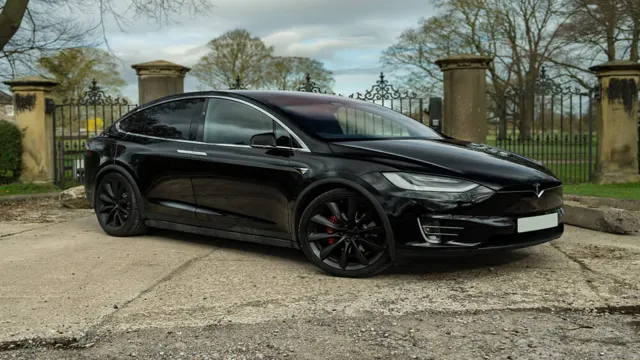Switching to Electric Cars: Uncovering the Surprising Economic Benefits
As concerns around climate change and pollution rise, many are beginning to question the long-term sustainability of our current transportation patterns. How could we cut down on greenhouse gas emissions and reduce our carbon footprint? One popular solution is the electric car. While they may have once been seen as a niche or luxury product, electric cars are now becoming more affordable and accessible for the average driver.
Despite this, some skeptics might wonder: are they really worth the investment? Luckily, there is a compelling economic case to be made for electric cars, and it goes beyond just environmental factors. As we explore the benefits of electric cars, it becomes clear that they have the potential to revolutionize the way we drive and live.
Lower Fuel and Maintenance Costs
One of the most significant economic benefits to owning an electric car is the lower fuel and maintenance costs. Unlike gas-powered cars, electric vehicles (EVs) rely on a rechargeable battery instead of regular gas fill-ups. This means that EV owners can save a substantial amount of money in fuel costs over time, especially as gas prices continue to rise.
In addition, electric cars require less maintenance than traditional gas-powered vehicles, as they have fewer moving parts and don’t require oil changes or transmission servicing. This translates into significant savings in repair and maintenance costs over the lifetime of the car. Moreover, owners of EVs can also benefit from government incentives, tax credits, and other financial incentives that can help to lower the cost of purchasing an electric car.
Overall, the economic benefits of electric cars make them a smart and sensible choice for anyone looking to save money on fuel and maintenance costs over the long term.
Electric cars cost less to operate and maintain than gasoline vehicles.
When it comes to electric cars, one of the most significant advantages is their lower fuel and maintenance costs. Unlike gas vehicles, electric cars can be charged at a lower cost, and some public charging stations even offer free charging options. This means that over time, EV owners save a considerable amount of money that would have otherwise gone into paying for gasoline.
Another advantage of electric cars is that they require less maintenance than gas vehicles. With no oil changes or engine tune-ups needed, EV owners don’t have to spend as much time and money on vehicle upkeep. While electric cars may have a higher upfront cost, their overall cost of ownership is much lower, making them a smart financial choice in the long run.
In short, electric cars offer a more cost-effective and eco-friendly alternative to gas vehicles.

Example: Electric cars can save drivers up to $10,000 over five years on fuel and maintenance costs compared to gasoline cars.
Electric cars are becoming increasingly popular, and one major reason is the lower fuel and maintenance costs compared to gasoline cars. In fact, studies have shown that electric car drivers can save up to $10,000 over five years on these costs. With no fuel needed and less moving parts, electric cars are more efficient and require less maintenance than traditional gasoline cars.
Plus, there are government incentives to help offset the purchase price of electric cars, making them more affordable to buy. Not only is it better for your wallet, but it’s also better for the environment since electric cars produce zero emissions. So why not consider making the switch to an electric car and reap the benefits of lower fuel and maintenance costs, as well as a cleaner environment?
Tax Credits and Incentives
Electric cars offer multiple economic benefits for consumers, including tax credits and incentives. Governments around the world are providing tax credits to incentivize the adoption of electric vehicles as a means of reducing carbon emissions. In the US, buyers of electric cars can receive up to $7,500 in federal tax credits, which can reduce the overall cost of ownership.
Additionally, some states offer their own incentives, such as rebates or tax credits, further reducing the cost of ownership. This economic benefit of electric cars not only helps the individual buyer but also the environment by promoting the uptake of clean energy vehicles. As more people switch to electric cars, the demand for traditional combustion engine vehicles will decline, leading to reduced dependence on oil and other fossil fuels.
Electric vehicles also have lower long-term maintenance costs, as the parts are less complex and require fewer repairs. Overall, the economic benefits of electric cars make them a sustainable and practical choice for the environmentally conscious consumer.
Federal and state tax credits can make electric cars more affordable for consumers and businesses.
Tax credits and incentives can be a significant factor in making electric cars more affordable for consumers and businesses. Both federal and state governments offer incentives to encourage the use of electric vehicles. Federal tax credits are available to eligible plug-in electric vehicles and can range from $2,500 to $7,500, depending on the electric car’s battery size.
However, the credits vary based on the vehicle manufacturer and depreciation limits. The electric vehicle incentives depend on the car’s purchase price and tax liability. Entrepreneurs can also make use of the Federal Business Energy Investment Tax Credit, which covers up to 30% of the charging infrastructure installation costs.
In addition to federal tax credits, states also offer incentives. Many of these incentives include rebates, tax credits, and reductions in vehicle registration fees. For example, Colorado offers a $4,000 tax credit for electric vehicles purchased or leased after January 1, 2020, and New York offers up to $2,000 in rebates for new electric car purchases.
These incentives encourage people to switch to electric cars, making them more affordable. Tax credits and incentives can be a significant factor in making electric cars more economical. With rebates, tax credits, and reductions in vehicle registration fees, the switch to an electric vehicle can be more affordable for many people.
By implementing these incentives, we help to reduce carbon emissions while incentivizing consumers and businesses to adopt the usage of electric cars.
Example: Qualified electric cars can receive up to $7,500 in federal tax credits and additional state incentives.
Tax Credits and Incentives If you’re in the market for a new electric car, you might be eligible for significant tax credits and incentives. Federal tax credits and rebates for electric cars vary from state to state, but you could receive up to $7,500 in federal tax credits alone. Additionally, some states offer their incentives, which can add thousands of dollars in savings.
These incentives could range from cash rebates and tax credits to free parking and toll fee waivers. However, it’s worth noting that these credits are only available for qualified electric cars, so it’s essential to check the eligibility criteria before making a purchase. Besides, some credits and incentives have a limited time frame, so it’s wise to act fast and claim them while they’re still available.
Overall, buying an electric car is not only good for the environment but can also help you save money in the long run due to the various incentives and tax credits available.
Lower Environmental Costs
Electric cars have been found to have a myriad of economic benefits, one of which is their relatively lower environmental costs. Compared to traditional gasoline-powered vehicles, electric cars can significantly reduce the carbon footprint, contributing to a cleaner and healthier environment. This is particularly important in the light of the ongoing climate crisis, which has mandated individuals, governments, and corporations to take urgent and concrete steps towards mitigating climate change.
With electric vehicles, people can now travel without emitting toxic gases and pollutants that harm not only the environment but also human health. The use of electric cars also allows individuals to save money on fuel costs, as electricity is comparatively cheaper than gasoline. Additionally, electric cars require less maintenance, reducing overall operating costs and making them more affordable in the long run.
With rising concerns over climate change and the depletion of non-renewable resources, switching to electric cars is not only wise but also beneficial for the economy and the environment.
Electric cars produce lower greenhouse gas emissions and help reduce air pollution.
Electric cars offer numerous benefits, including lower greenhouse gas emissions and reduced air pollution. These factors translate into lower environmental costs, which is great news for everyone. In comparison to gasoline-powered vehicles, electric cars produce fewer emissions, which means that they release less carbon dioxide into the atmosphere.
Additionally, they emit fewer pollutants, such as nitrogen oxides, particulate matter, and sulfur dioxide, which help to reduce air pollution and improve air quality. By driving an electric car, you are not only saving money on fuel costs, but you are also making a positive impact on the environment. Not only that, but you can also enjoy a quieter ride, as electric cars are generally less noisy than traditional vehicles.
By choosing to go electric, you are making a choice that benefits both you and the planet. So, why not make the switch today and enjoy the benefits of driving an electric car?
Example: Electric cars emit up to 50% less greenhouse gases over their lifetime compared to gasoline cars.
Electric cars are quickly becoming a popular option for many drivers, and for good reason. Studies have shown that electric cars emit up to 50% less greenhouse gases over their lifetime compared to gasoline cars. This makes them a great choice for environmentally-conscious individuals who want to reduce their carbon footprint.
But it’s not just about the emissions. Electric cars also have lower environmental costs in terms of noise pollution, air pollution, and land use. With fewer moving parts, they require less maintenance and produce less hazardous waste.
Additionally, many electric cars are now powered by renewable energy sources like solar or wind power, making them an even cleaner choice for those looking to reduce their impact on the environment. So the next time you’re in the market for a new car, consider going electric and help contribute to a greener future.
Conclusion: Electric Cars Benefit Your Wallet and the Planet
In conclusion, electric cars not only provide environmental benefits, but also economic benefits. By reducing our reliance on fossil fuels and reducing transportation costs, electric cars have the potential to boost job growth and improve our overall financial stability. Not to mention, they’re just plain cool – who doesn’t want to ride around in a car that’s both eco-friendly and cutting edge technology? So go ahead, make the switch to electric – your wallet and the planet will thank you.
“
Electric cars offer significant economic benefits while also helping to protect the environment.
When it comes to electric cars, one of the biggest benefits they provide is reducing environmental costs. Combustion engines release harmful emissions that contribute to air pollution and climate change. In contrast, electric cars emit significantly fewer pollutants into the atmosphere, resulting in less smog and cleaner air.
This not only benefits our health but also our planet. Moreover, electric cars can also help to reduce our reliance on fossil fuels, which are finite resources, and transition towards renewable energy sources such as solar, wind, or hydro. By investing in electric cars, we can make significant strides towards protecting our environment and creating a more sustainable future for generations to come.
And the best part is that these benefits come with economic advantages too. You can save on fuel costs since electric cars are cheaper to run than traditional gasoline cars. Overall, electric cars offer a win-win solution that benefits both our wallets and the environment.
FAQs
What are the economic benefits of electric cars?
Electric cars offer significant economic benefits over traditional petrol or diesel cars, including lower fuel and maintenance costs, tax incentives, and reduced emissions fees.
How do electric cars impact the economy?
The widespread adoption of electric cars can boost local economies through job creation in the manufacturing and charging infrastructure sectors, as well as reducing a country’s dependence on foreign oil.
Are electric cars more expensive to buy than traditional cars?
While the upfront cost of buying an electric car may be higher, they are typically cheaper to maintain and fuel in the long run, resulting in significant savings over time.
Can electric cars save you money on taxes?
Yes, many governments offer tax incentives for purchasing electric cars as a way to encourage their adoption and reduce emissions. Additionally, electric cars may be eligible for reduced or waived toll fees and parking costs.


